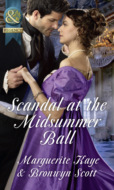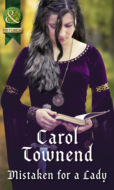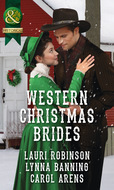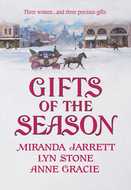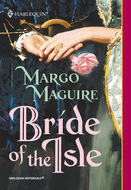Raamatut ei saa failina alla laadida, kuid seda saab lugeda meie rakenduses või veebis.
Loe raamatut: «Stolen Heiress»
“I will marry you, Mistress Clare.”
She stared at him incredulously. “Are you quite mad?”
“Not at all. You are a wealthy heiress. The proposal seems perfectly fair to me.”
“I shall never consent to become your wife,” she said through clenched teeth. “You cannot force me.”
“Mistress Clare, may I remind you that you are in my power—totally within my power?”
“Then I must do as you say,” she said, her eyes filling with tears.
Stolen Heiress
Joanna Makepeace
MILLS & BOON
Before you start reading, why not sign up?
Thank you for downloading this Mills & Boon book. If you want to hear about exclusive discounts, special offers and competitions, sign up to our email newsletter today!
Or simply visit
Mills & Boon emails are completely free to receive and you can unsubscribe at any time via the link in any email we send you.
JOANNA MAKEPEACE
taught as head of English in a comprehensive school before leaving to write full-time. She lives in Leicester with her mother and a Jack Russell terrier called Jeffrey, and has written over thirty books under different pseudonyms. She loves the old romantic historical films, which she finds more exciting and relaxing than the newer ones.
Contents
Chapter One
Chapter Two
Chapter Three
Chapter Four
Chapter Five
Chapter Six
Chapter Seven
Chapter Eight
Chapter Nine
Chapter One
Clare Hoyland stood near the glazed window of the solar, looking out over the herb plot. It had snowed three days ago, but there had been a partial thaw and most of the snow had melted. However, last night there had been a hard frost and the remainder had iced over so the brown earth was iron hard. It would be difficult going for the men on this foray.
Clare shrugged her squirrel-lined cloak round her shoulders for it was still cold within the solar, despite the logs burning brightly in the hearth and an extra brazier near the side window. She had put on the cloak for extra warmth, yet perhaps it was her misgiving for this venture which caused her to shiver so violently. In this winter of 1461, who could know what the future would hold?
Certainly the hopes of the Duke of York had foundered at Sandal only weeks ago. Her uncle, Sir Gilbert Hoyland, and her brother, Peter, had crowed over the Lancastrian victory which had given Queen Margaret the day and allowed her the vindictive pleasure of having the unfortunate Duke’s head placed high on Micklegate Bar in York and topped with a crude paper crown some wag in her train had made for her. In such a fashion was the Yorkist victory of St Albans overturned and, to Sir Gilbert’s and Peter’s joy, the death of her father avenged.
Clare could not be glad of these tidings. The wars had continued for so many months now and so many unfortunates slain both in the several battles and skirmishes and also within the constant armed sallies of companies on both sides. She had mourned her father deeply, of course, but nothing could bring him back to them. This useless quarrel with their neighbours, the Devanes, in her estimation, could do no good whatever.
She sighed as she returned to her chair by the fire and leaned forward to warm her chilled hands at the blaze. This latest feud had started in so senseless a fashion: a sucking pig stolen from one of their sties, meant for the final feast of Twelfth Night. Their steward had investigated and determined that one of the men-at-arms from the Devane manor had been responsible.
Certainly there were tales that a roasted pig had been enjoyed by the Devane retainers on the last but one night of the Christmas festivities. A man-at-arms had boasted of the plunder to some village wench and a skirmish had broken out between armed men from both manors. A Hoyland sergeant had died and Sir Gilbert had declared his intention of demanding satisfaction and compensation.
Sir Humphrey Devane had sent back an insulting reply and, early this morning, a company of Hoyland men-at-arms had sallied out, breathing threats of fire and slaughter against their habitual rivals. It was all so pointless. Clare prayed that no other soul paid with his life for such senseless folly, nor any man be badly wounded as a result of this ceaseless wrangling between the manor lords.
She could not believe the Devanes in any way responsible for her father’s death at St Albans. The Devanes were declared Yorkists. It was said that the younger son, Robert, served in the train of the Earl of Warwick, cousin to great York. Sir Humphrey and his son, Walter, had fought at St Albans on the Yorkist side but many men had done so. The death of her own father couldn’t be laid at their door. But the feuding had continued.
Now, since the Yorkists had been driven from their stronghold of Ludlow Castle by Queen Margaret’s force and York’s widow, Proud Cecily, taken prisoner with her two youngest sons, the fortunes of the Yorkists had declined and, with the death of York at Sandal near Wakefield, were at their lowest ebb.
Clare could not dismiss the thought that it was this very notion that had prompted her uncle to risk an unprovoked attack upon his neighbour. Sir Humphrey was unlikely to complain to the King’s justices, whatever the outcome, as many Yorkists had been proscribed and their estates and property seized by the vengeful Queen.
Throughout Clare’s eighteen years of life she had had to listen to her father’s, her brother’s, and now her uncle’s constant carping complaints about their neighbours. She sighed again. Since the death of her mother, almost five years ago, she had been forced to gradually take into her own hands the management of the manor. She knew, well enough, her father had been wealthy enough to harbour no feeling of envy towards the Devanes, whose prosperity could never match their own.
Now Peter, at twenty-one, had inherited and she wondered how soon it would be before he brought a bride home, to oust Clare from her position of authority within the household. It was a moment she both dreaded and welcomed. She would be glad to be rid of the responsibility, for her endeavours were rarely praised by her brother. Since childhood he had bullied and despised his younger sister, resenting the love their father had had for her, and now he made no secret of the fact that he considered her a decided encumbrance.
‘Sweet Virgin,’ he had declared only last night at supper, ‘what is to be done with a plain creature like you? I don’t know. With the country in such a state of disarray it will be even more difficult to find a suitable husband for you, and God knows I’m disinclined to provide a dowry for you to become a Bride of Christ.’
Clare had been heartily thankful for that decision. She had no vocation to take the veil, but neither had she any desire to remain on the manor, a poor relation, the butt of Peter’s unkindness and either ignored or resented by a new mistress of Peter’s choosing.
So far he had made no attempt to seek a wife. The Court had moved from place to place, constantly on the move under the fretful rule of the warlike Queen Margaret and neither she nor the saintlike and feebleminded King Henry showed any inclination to arrange Court alliances.
Peter aimed high, since his wealth entitled him to the hand of some lady from an influential family who could assist him into the counsels of the nobility. For so long as he was prepared to wait, Clare would be expected to manage Hoyland Manor for him competently and without complaint.
Aware that she was not beautiful, not even remotely pretty, Clare seldom bothered to press for elaborate gowns or jewellery and infrequently looked at her reflection in the small ornamental mirror of Italian glass presented to her by her father on her tenth birthday.
In it she had seen that her features were, indeed, un-remarkable. Her hair was brown, almost mousey, she thought ruefully, her face oval, but her brows were too dark and heavy and dominated her olive-tinted face. She would have preferred to have had a pink and white complexion like her uncle’s daughter, Isabel, whose golden locks and large blue eyes had been greatly admired. Clare’s eyes were large and her father had fondly declared them luminous, but were an undistinguished grey.
Peter’s dark good looks were attractive to the manor wenches, Clare had noticed, but her own, by comparison, were simply acceptable, though she was not ugly. She possessed some good features; her mouth was wide and generous but she determined her nose too large and not enhanced by the slightest tendency to tilt up at the end. To add to all this, she was over-tall for a woman and gawky, her clumsiness increased by being continually under the critical gaze of her older brother.
Clare stayed huddled near the fire, glad to be alone for a while. She had been busy inspecting the kitchen, buttery and dairy. Soon she must go into the hall and make sure the trestles were being put up in readiness for the evening meal. She hoped the corner she had curtained off would not be required to house any wounded men her uncle brought back with him. She leaned her head back against the padded head-rest of her chair and closed her eyes.
It was good to be here, quiet without the fussy attentions of Bridget, the kitchen wench she had tried to train as a personal maid. The girl was willing but talked incessantly and found it hard to retain instruction from one day to the next.
It was growing dark in the room already and someone would be up shortly to seek her permission to light candles and prickets. She had insisted that the use of them be curtailed somewhat. Recently they had been left burning too long and supplies of mutton fat and tallow were dwindling.
She thought she heard a lone horseman ride into the courtyard, but did not stir. She would know by the number of horsemen and the noise of arrival, the shouts and demands for service, when the raiding party returned. She was more than a little irritated when she heard feet ascending the stairs and Bridget’s over-shrill voice calling for leave to enter the solar.
‘Mistress Clare, oh, please, Mistress Clare, you must come at once…’
Bridget was always easily excited and Clare rose reluctantly. Obviously some domestic crisis demanded her attention. Possibly one of the maids had scalded herself or cut herself in the kitchen.
‘What is it, Bridget?’ Already she was on her feet and turning towards the door.
It flew open and a panting and tearful Bridget erupted into the room. Behind her, grim-faced and equally short of breath from the hasty climb up the stair, was one of Sir Gilbert’s men. The fellow had come with her uncle from his own manor in Northamptonshire and so was not well known to Clare. He stopped in the doorway and hastily ducked his head in an embarrassed gesture of respect.
‘Mistress…’
She stood stock-still and faced him, as if, already, she knew he brought ill tidings.
‘What is it, man? Clearly you have been sent back to me in great haste. Is Sir Gilbert hurt? I have already made preparations in case…’
His wide-spaced eyes regarded her steadily, then, meeting her anxious gaze, awkwardly drew away to look well beyond her.
‘It’s—it’s Sir Peter, mistress, he’s—’ frantically the messenger drew a hard breath ‘—he’s—he’s dead, mistress, took an arrow in the gorget. He—he lived only moments. There was nothing anyone could do.’
He waited while the shock of his news registered fully, then he added, ‘Sir Gilbert sent me ahead to warn you—let you prepare. There are one or two men slightly wounded and there are—prisoners.’ She remained very still, hands clasped tightly before her and he rushed on, ‘The raid was successful, mistress. Sir Gilbert bade me tell you the Devanes paid hardly for—for Sir Peter’s death.’
She moved at last very slowly towards him. Bridget was sobbing hysterically and Clare said curtly, ‘Stop crying, girl. There is much to be done and I shall need you.’ Her legs were trembling and resolutely she tightened her back muscles. She must not collapse weakly into her chair. Her uncle would need her to organise the household. There would be time later to grieve.
‘Bridget, send one of the grooms for Father Crispin. Go now, quickly, then go into the hall and halt preparations for supper there. A—a trestle must be put up ready—to receive Sir Peter—when—when they bring him home. We shall need two wax candles and the large candlesticks to place at the head and the foot of the trestle and—’ Her eyes were blurring with sudden tears and her mind dulling with reaction. She could not think beyond the need to receive her brother’s body.
Sweet Virgin, they had all gone out in such haste, on a drunken whim—had he been in a state of grace? He had been so confident that he could wreak havoc at the Devane manor and return with loot—her mind shied from all the ugly realities of the attack. There would be burning and pillage—the Hoylands had been victorious her uncle’s messenger had informed her. What did that mean? Had they fired the Devane manorhouse? Had women been subjected to—and Peter dead in the midst of all this wickedness and all unprepared—?
She brushed away tears with the back of her hand as the man turned awkwardly, as if uncertain how to proceed now that his errand was done. Bridget cast her another frightened, startled glance and then scrambled in an undignified rush down the stairs to summon the village priest.
Clare hastily crossed herself and murmured a prayer to the Virgin for the well-being of her brother’s soul, then hurried down to the hall. Servants were gabbling excitedly as she entered and then hushed abruptly. She signalled them to continue with their work, then called to Bridget again.
‘Has someone gone for Father Crispin?’
‘Yes, mistress.’
‘Then go into the kitchen and prepare a ewer of warm water, basin and towels.’ She blinked back tears again. ‘We shall need to wash—Sir Peter, and I shall need fresh clothing for him. See to it.’
The girl sped off again as if relieved to be out of her mistress’s presence. A trestle was made ready in the oriel embrasure and covered with an embroidered bed-covering from Sir Peter’s chamber. There was no private chapel at the manor—the household used the parish church in the nearby village. Peter would need to remain here, until final preparations could be made to receive his body into the chancel tomb in the church to which her family had made considerable contributions of coin for the last century or more.
They would need to summon a craftsman to create a brass-or an image-maker from Bristol. Her father’s tomb on one side of the chancel was still waiting for the completion of his image. Clare knew her mind was grappling with these future problems rather than coping with the immediate feelings she was trying to repress.
Noise came from the courtyard now and she knew the van of the little company was riding in. She nodded to the two serving-men near the prepared trestle as the tall candlesticks were being placed in position, then moved to the screen doors and took up her place at the top of the steps over the undercroft, leading to the hall.
Sir Gilbert Hoyland rode into the courtyard, dismounted and walked stiffly towards her. He was a shorter man than either her father or Peter had been, but formidable looking for all that. He was dark like most of the Hoylands, with craggy features roughened by the wind for he was a soldier and spent much of his time out of doors. He mounted the steps, briskly drawing off his mailed gloves.
‘They are bringing him on a horse litter.’ He bent to touch her hand and she nodded acknowledgement. He swallowed hard as if uncertain how to say more, then cleared his throat. ‘I wish I could have done something, but it was too late for a physician. He—he died very quickly. I think he felt little…’
‘So your man informed me.’ Clare’s voice was a little hoarse. ‘I—I have sent for the priest. All is prepared. The men will have to eat elsewhere than in the hall tonight. Later, we can arrange for them to bed down—’
‘I’ll see to all that,’ he agreed. ‘You’re a sensible wench, Clare, thank the Lord. I think,’ he added heavily, ‘that Peter did not always appreciate that.’
He turned from her to let his gaze dwell on the gathering in the yard below as men came in, some on foot, trailing pikes and bills. Most appeared to be whole, Clare noted, mechanically, though one was being supported by a companion and several were clutching oozing wounds on arms and lower limbs.
The older serving-women she could trust would be able to deal with these minor wounds and refer anything more serious to her later. She had herb lore from her mother and would be competent to deal with most problems. Anything that threatened life or the continued use of the sword arm, or became infected, might have to be left to an apothecary in Leicester she had used on occasions. Her duty now was to tend Peter’s body.
At last she saw the horse litter being drawn into the yard from the gatehouse arch and her lips trembled slightly. She could see the outline of the still form covered with a frieze cloak and supported on each side by two men on foot so that it did not slide from the hastily constructed litter of wattle, probably torn from some sheepfold.
Her attention passed briefly from the sombre sight to a pitiful group of prisoners, pushed unceremoniously along from the rear, prodded by the Hoyland men wielding daggers and broadswords. All were staggering, their garments mudstained; one who towered over the rest was walking proudly though obviously inconvenienced by a wound near the thigh, judging from his blood-drenched woolen hose.
He was the tallest man Clare had ever seen, and she was no small woman herself. He was no mere man-at-arms, that was clear, for he carried himself like a king and with a swagger to match. He stumbled and almost fell as a sudden prod from behind jerked him forward close to the litter bearing the dead man. Clare saw him right himself and stand, head high, staring back at the two on the steps.
He had bright hair, she thought, almost red gold. From this distance she could not discern his features clearly, but the very carriage of the head and the haughty movement to stand erect, despite his injury, and the fact that his hands were pinioned behind him, told her that he was used to admiration, probably from other men as well as women.
She drew her gaze from him and moved slightly forward as her brother’s body on the wattle hurdle was unhitched from the horse traces and two men moved into position to convey it towards the foot of the hall stair. They managed the awkward passage of stairs with difficulty and, shoulder high, conveyed their lord into the hall through the screen doors.
Clare moved quietly beside the litter while Sir Gilbert went ahead of her, to instruct the men as to the disposition of their burden. He gave thought briefly to his prisoners still waiting below.
‘Keep them all securely guarded in the stable,’ he snapped. ‘As to the red-headed fellow, I’ll have the hide of any man who allows him to escape.’
An elderly serving-maid and the frightened Bridget were waiting with the required water and cleaning cloths. Clare motioned away the two men-at-arms who were still hovering over her brother’s body. She looked down at him after she had drawn back the covering cloak. At this moment she could not be sure of her own feelings for Peter. There was grief, certainly, and a numbed awareness, an overwhelming pity for the loss of the satisfying life which had stretched before him.
He had had everything to live for, the promise of love and children, a fulfilled life managing the manor and estates. All this had been snatched from him by the dispatch of a single lethal arrow. She could see the broken-off haft still protruding from the gap between his breastplate and gorget. Dispassionately she thought, I shall need a man’s strong hand to help me withdraw that before I can begin to lay him out decently.
She could not dismiss the thought that he had deliberately sought this violence which had destroyed him and she shied from the thought that she had not truly loved him. Peter had not been an affectionate brother. Now he was gone and she could not begin yet to worry about what would happen to her now.
Her uncle moved closer to her side and placed a hand upon her arm. She was not sure if this was a clumsy attempt to comfort her, but she turned and acknowledged the gesture with a half-smile.
He said, abruptly, ‘Summon your steward and between us we’ll get him out of his armour and clothing before you start to prepare the body. Don’t concern yourself. I’ll deal with the arrow.’
She nodded and the older woman set down her basin of water and hastened off to fetch Master Clements, their steward. He came hastily, ushering in Father Crispin, who was clearly shocked and looked hurriedly around the hall for Clare to give him instructions.
Clare abandoned her brother to the care of her uncle and Master Clements and went to the elderly, frail priest. He listened, wide-eyed, while she explained what she knew of the raid, and nodded with lithe birdlike movements of his head when she told him their needs. Once the body had been laid out he would immediately say the prescribed prayers for the repose of Sir Peter’s soul and eventually make the necessary arrangements for burial in the church chancel.
She went about her task of washing and laying out her brother’s body with a calm sense of acceptance. She had dismissed Bridget, whose hands were shaking so badly that she had threatened to spill water over all of them. The older woman helped Clare and together, competently, they completed their work, dressing the still form in a clean linen shirt. Then Clare knelt beside her uncle as Father Crispin began to intone the offices for the dead.
Later she went to see that the work of caring for the wounded in the curtained-off section of the hall was proceeding smoothly and efficiently. She was satisfied; her mother had taught Clare herself and the women of the household well.
They had had ample opportunity to perfect their skills, Clare thought wearily, over the last years when they had needed to deal not only with the minor accidents which occurred about the manor but with the injured men who continually returned to them from the various skirmishes and battles brought about in this jockeying for power between the weak King Henry and his cousin the mighty Plantagenet Duke of York.
York was dead now but his son, Edward of March, would succeed him, backed by the powerful Neville lord, Richard Earl of Warwick, and the struggle would be continued with renewed hatred on both sides.
She was about to withdraw from the hall when her uncle signalled to her.
‘There is a special prisoner I would like you to tend personally, or, at least, see to it that he is fit to travel tomorrow or soon after. I intend to send him to Coventry to the King’s court there. I’ve no authority, more’s the pity, to deal with the fellow here.’
Clare looked at him curiously and he explained.
‘He’s Sir Humphrey Devane’s younger son, Robert. We took him prisoner after a bitter struggle, but his leg is injured. He could walk well enough but he was losing blood and I don’t want him to collapse on me before he reaches Coventry.’
‘You intend to demand ransom?’ Clare was puzzled. Surely there would be more likelihood of that if the King were not informed. She was only too aware that this private quarrel and the attack on the Devanes could be regarded as unlawful and her uncle could place himself in the wrong by submitting this prisoner for the King’s justice. The man might well plead his cause and come from the court the victor.
‘No,’ her uncle growled and a wolfish expression curled back his upper lip and revealed sharp, predatory white teeth. ‘Robert Devane is one of Warwick’s whelps, served him as squire. It was unfortunate for him he was present at his father’s manor today.
‘The fellow is an out-and-out pirate. Since Warwick fled from England with other Yorkist curs and took refuge in Calais with his tail between his legs, he and that scum he calls his followers have been preying on shipping from their stronghold at the port of Calais. I’ve no doubt Queen Margaret will be delighted to get her hands on this Devane dog and will, doubtless, hang him out of hand.’
Clare moved back, a trifle repelled by the note of vengeful spite she heard in her uncle’s tone. She felt slightly sick. She was being requested to see to the tending of this man so that he might recover, only to end his life ignominiously kicking upon the gallows. Nevertheless, it was incumbent upon her to see that their prisoner did not suffer unduly while he remained in their charge.
‘Where is he?’ she asked curtly. ‘I’ll see to it myself.’
‘Locked in the barn. I’ll get my sergeant to show you and remain close to see you protected from insult.’ He laughed harshly. ‘He cannot harm you, he’s too closely watched.’
Clare swallowed. She did not relish her task and her senses were still shocked by Peter’s death. She called to her elderly maid. Bridget would be of no use whatever, half-frightened out of her wits by the sight of the Devane prisoners.
Sir Gilbert’s sergeant accompanied her to the guarded barn. They had no dungeons at Hoyland. Indeed, the manor was not crenellated, had never received a license from the King. For almost two centuries, the snug, well-built house of warm yellowed brick had lain protected within the small vale carved out from a stream, a tributary of the River Nene.
The Hoylands had been granted the land by the Conqueror and the house had replaced a wooden one and been gradually added to over the years. Even the violent tumultous times following the death of King Henry I had not touched the peace of this land lying upon the boundary of Leicester and Northampton shires, until the bitter spirit of envious greed for power and fortune had come with this recent struggle for the Crown.
Clare’s father’s prisoners, more usually men who had poached unlawfully or been guilty of some wanton, drunken behaviour which had offended their neighbours, had been confined briefly within barn or byre to be judged at the manor court. Now, their more noble prisoner had been kept here to await his fate from a more vengeful soul than her father or even Peter would ever have proved.
Even here, at this secluded manor, Clare had heard of the awe and dread in which the Angevin Queen was held, even by her own followers. Henry might be merciful but Margaret held sway in the Lancastrian Court and if this son of the Devanes was held to be guilty of piracy upon the high seas then he would, undoubtedly, receive short shrift and hang.
Two stalwart men-at-arms guarded the barn door. Sir Gilbert’s sergeant barked out a quick command and one unlatched it and the two stood back to allow Clare to enter with her escort. The place was gloomy, for the wintry sun, already leaving the darkened sky, had not reached into the interior so Clare advanced cautiously, unable, at first, to see where the prisoner was.
‘I shall need some light,’ she told the sergeant. ‘Can one of your men fetch me a brand?’
Again an order was barked out and the taller of the two men set out in search of a lighted pitch brand which could be fixed into a sconce on the barn wall.
There was a slight stir and movement of soft hay still strewing the floor, then Clare saw the vague outline of a man rise from a seated position near the wall and push himself upright to face his visitors.
A pleasant, slightly husky voice said, ‘Ah, some show of hospitality, at last. I hope Sir Gilbert hasn’t the intention of starving his guests. It must be well nigh suppertime.’
The sergeant snapped, ‘You, be silent. You’ll get fed when and if we feel inclined to do so and certainly not if you’re insolent with the mistress of the house who has come to tend your wound.’
‘Indeed?’ The pleasant voice sounded vaguely curious and Clare thought the man inclined his head towards them as if to view her. Neither could see the other at this stage until the man-at-arms came running and thrust the lighted brand into the hands of his sergeant who turned to fix it into the iron sconce behind him.
Immediately the dim place flared with golden light and Clare saw that her patient was, as she had suspected, the tall red-headed man she had seen limp in earlier behind her brother’s bier. He was leaning for support against the wall and, seeing her clearly now for the first time, he gave her a mocking bow. The action cost him dear, for he winced sharply and almost fell forward, losing, momentarily, the support of the roughened stone of the wall behind him.
Clare thought either the wound was more serious than she had first thought and he had lost a great deal of blood, or he had stiffened during his awkward, half-crouched stay on the floor. It was icy cold in the barn and she shivered and pulled her cloak closer around her. Afterwards, she could not have said whether the movement was actually because she was cold or because she had no wish for this man to see her body more clearly.
She stepped nearer and saw the brand light up his face, haloed with flickering gold flares, and touch shimmering sparks from his flaming red hair. She had been unable to guess at the cast of his features when she had seen him first in the courtyard, only that he was tall and seemingly red-headed, now she saw he was incredibly handsome, in a bold, inviting way.
Tasuta katkend on lõppenud.



